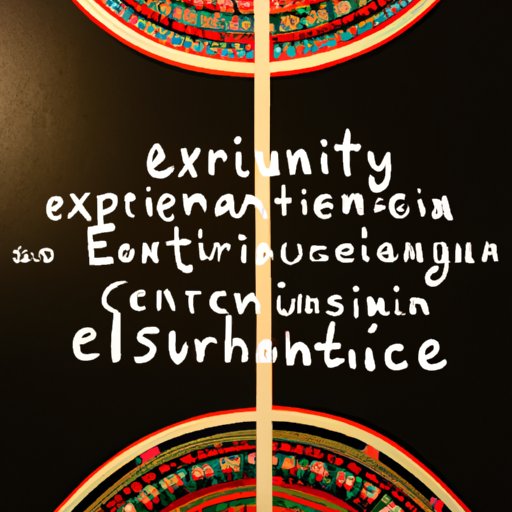Introduction
Cultural relativism and ethnocentrism are two contrasting views on how to interpret and evaluate different cultures. The former holds that all cultures should be respected and judged according to their own standards, while the latter argues that one’s own culture is superior to others. This article will explore the differences between cultural relativism and ethnocentrism and examine their implications for society.

Exploring the Contrast Between Cultural Relativism and Ethnocentrism
Cultural Relativism
Cultural relativism is the view that all cultures should be respected and judged according to their own standards and values. This means that each culture has its own unique way of understanding and interpreting the world, and this should not be judged or compared to any other culture. According to cultural relativism, no one culture is inherently better than another; rather, all cultures should be viewed as equally valid.
The main belief behind cultural relativism is that all cultures have something valuable to offer, and that each culture should be given the opportunity to express itself. This view also emphasizes the importance of understanding other cultures and being open to ideas from outside one’s own culture. Additionally, cultural relativism acknowledges the diversity of human experience and encourages mutual respect and tolerance of different cultures.
One example of cultural relativism can be seen in the work of anthropologist Franz Boas, who argued that all cultures should be studied objectively and without bias. He believed that it was important to understand the unique beliefs and practices of each culture, instead of judging them based on one’s own cultural values. Boas’ work had a major influence on the field of anthropology and helped to promote an appreciation for cultural diversity.
Ethnocentrism
Ethnocentrism is the view that one’s own culture is superior to others. This means that one’s own culture is seen as the only valid way to think and act, and any other culture is assumed to be inferior. Ethnocentrism is often characterized by a lack of respect for other cultures and a tendency to judge them according to one’s own standards.
The main belief behind ethnocentrism is that one’s own culture is the best and only acceptable way of life. This view implies that any culture that does not adhere to one’s own values and beliefs is wrong or inferior. Ethnocentrism often leads to prejudice, racism, and discrimination because it assumes that one’s own culture is superior to others.
An example of ethnocentrism can be seen in the colonial period, when European powers sought to colonize and control other cultures. During this time, many Europeans believed that their own culture was superior to those of other countries, and they used this belief to justify their actions. As a result, they treated other cultures as inferior and attempted to impose their own values and beliefs on them.
A Comparison of Cultural Relativism and Ethnocentrism
Although cultural relativism and ethnocentrism are two contrasting views, there are some similarities between them. Both views acknowledge the importance of culture and emphasize the need to respect and understand other cultures. However, there are several key differences between the two views.
Differences in Perspective
The most fundamental difference between cultural relativism and ethnocentrism is in their perspectives. Cultural relativism takes an objective view of other cultures, emphasizing the need to understand them without judgment. Ethnocentrism, on the other hand, takes a subjective view, assuming one’s own culture is superior to others. This difference in perspective leads to different approaches when evaluating cultures.
Differences in Approach
Cultural relativism promotes an open-minded approach to understanding other cultures. This means that one should strive to understand another culture without imposing one’s own values and beliefs. Ethnocentrism, however, encourages a closed-minded approach, assuming one’s own culture is the only valid way to think and act. This difference in approach leads to different judgments when evaluating cultures.
Differences in Judgment
Cultural relativism encourages people to accept and respect other cultures without judgment. This means that one should not assume that one’s own culture is superior to others. Ethnocentrism, however, encourages people to judge other cultures according to their own standards. This leads to a tendency to view other cultures as inferior and to attempt to impose one’s own values and beliefs on them.

Examining the Tensions Between Cultural Relativism and Ethnocentrism
The differences between cultural relativism and ethnocentrism can lead to tensions between individuals and cultures. These tensions can manifest in a variety of ways, including the clash of perspectives, the conflict of values, and the struggle to compromise.
The Clash of Perspectives
When two individuals or cultures hold different views, it can lead to a clash of perspectives. In the case of cultural relativism and ethnocentrism, this can manifest in disagreements over how to interpret and evaluate other cultures. For example, someone who believes in cultural relativism may disagree with someone who believes in ethnocentrism about the validity of other cultures.
The Conflict of Values
The clash of perspectives between cultural relativism and ethnocentrism can also lead to a conflict of values. For example, if one person believes in cultural relativism and another believes in ethnocentrism, they may have different opinions on which values are more important or which ones should be followed. This can lead to disagreements and even hostility between individuals.
The Struggle to Compromise
The tension between cultural relativism and ethnocentrism can also lead to a struggle to compromise. For example, if two individuals hold different views on how to interpret and evaluate cultures, they may find it difficult to reach an agreement. This can lead to frustration and even hostility if neither side is willing to compromise.

An Overview of the Contrasting Views of Cultural Relativism and Ethnocentrism
Both cultural relativism and ethnocentrism have both advantages and disadvantages. On the one hand, cultural relativism encourages an open-minded approach to understanding and respecting other cultures. This can help to foster mutual understanding and respect between individuals and cultures. On the other hand, ethnocentrism can lead to prejudice, racism, and discrimination if it is taken too far.
The impact of cultural relativism and ethnocentrism on society can vary depending on the context. In some cases, cultural relativism can help to create a more tolerant and accepting society. In other cases, ethnocentrism can lead to social divisions and conflict. Therefore, it is important to consider the potential effects of these two views before making any decisions.
Dissecting the Distinctions Between Cultural Relativism and Ethnocentrism
In order to fully understand the differences between cultural relativism and ethnocentrism, it is important to look at the philosophical foundations of each view. It is also important to examine the historical context in which these views emerged, as this can provide valuable insight into their implications for society.
Analyzing the Philosophical Foundations
Cultural relativism and ethnocentrism have different philosophical foundations. Cultural relativism is rooted in the idea that all cultures should be respected and judged according to their own standards. Ethnocentrism is based on the assumption that one’s own culture is superior to others. Examining the philosophical foundations of these two views can help to better understand their implications for society.
Examining the Historical Context
It is also important to examine the historical context in which these two views emerged. For example, cultural relativism was popularized by the work of Franz Boas in the early 20th century. Ethnocentrism, on the other hand, can be traced back to the colonial period, when European powers sought to colonize and control other cultures. Examining the historical context can help to better understand the implications of cultural relativism and ethnocentrism for society today.
A Study of the Differences between Cultural Relativism and Ethnocentrism
In order to better understand the differences between cultural relativism and ethnocentrism, it is important to assess the advantages and disadvantages of each view. It is also important to examine the role of culture in conflict resolution, as this can help to identify potential solutions to conflicts between individuals or cultures.
Assessing the Advantages and Disadvantages of Each
Cultural relativism and ethnocentrism both have advantages and disadvantages. Cultural relativism encourages an open-minded approach to understanding and respecting other cultures, which can help to foster mutual understanding and respect. However, it can also lead to a lack of objectivity when evaluating cultures. Ethnocentrism can lead to prejudice, racism, and discrimination if it is taken too far. However, it can also help to create a sense of unity and shared identity.
Examining the Role of Culture in Conflict Resolution
Culture can play an important role in conflict resolution. Understanding and respecting other cultures can help to reduce tensions between individuals or groups. It can also help to identify common ground and potential solutions to conflicts. Examining the role of culture in conflict resolution can help to identify potential strategies for resolving conflicts between individuals or cultures.
Conclusion
In conclusion, cultural relativism and ethnocentrism are two contrasting views on how to interpret and evaluate cultures. They differ in their perspectives, approaches, and judgments. Examining the philosophical foundations and historical context of these two views can help to better understand their implications for society. Additionally, assessing the advantages and disadvantages of each view and examining the role of culture in conflict resolution can help to identify potential solutions to conflicts between individuals or cultures.
(Note: Is this article not meeting your expectations? Do you have knowledge or insights to share? Unlock new opportunities and expand your reach by joining our authors team. Click Registration to join us and share your expertise with our readers.)
